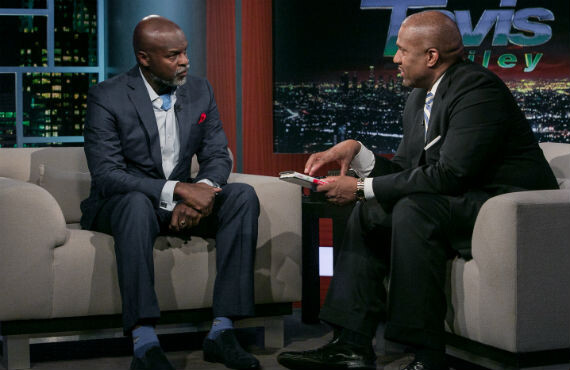Penn Professor Tukufu Zuberi Is Expanding the Role of the Public Intellectual
“Preach!” is a common refrain heard among audience members when Tukufu Zuberi gives a public talk. “Preach,” someone will say in affirmation when he speaks passionately about Africa’s central role in world affairs or rails against racism.
The University of Pennsylvania professor of sociology and Africana studies is a public intellectual who extends his teaching around the world across multi-media platforms.
Whether he’s in a college classroom, on the set of a TV or film production or meeting with an African head of state, Zuberi is always teaching.
“My job as a professor is to profess the information that will give people the knowledge they need to change the world they live in,“ Zuberi says. “I’m a critical sociologist because I believe that societies up until this point have hinged on relationships of exchange and, when those relationships are unequal, it results in a bad situation for the person on the less than equal side.”
A frequent media commentator, he regularly appears on television and radio news programs. Recently he was a guest on the Tavis Smiley show on PBS.
“If you do not understand Africa, you cannot understand the world.” Zuberi told Smiley during the interview. “And if you want to understand Africa, you have to put it in the context of the world.”
Zuberi is the author of numerous books and publications on race and African Diaspora populations, including the just-released book African Independence, the companion text to his 2013 documentary by the same name. The film — his first — has won several awards including Best Director, Best African Film and Best Documentary at the San Diego Black Film Festival and Best Director at The People’s Film Festival.
Zuberi says he believes that the academic continues to be important in society but that scholarship is only important to scholars.
“We can no longer write books or simply be pundits on television,” Zuberi says. ”We have to take control of the reins by continuing to write the books that we write but connecting them to audio visual expressions of the ideas that we’re talking about and presenting them in a way that gives access to a broad audience.”
As a filmmaker and scholar who lectures extensively, Zuberi expands the role of public intellectual for a new generation and brings his scholarship to unexpected places, like museums.
In 2013, he curated two major Africa-related exhibitions, “Tides of Freedom: African Presence on the Delaware,” at the Independence Seaport Museum in Philadelphia and “Black Bodies in Propaganda: The Art of the War Poster” at the University of Pennsylvania Museum of Archaeology and Anthropology..
Born Antonio McDaniel, the professor grew up in the housing projects of Oakland, Calif., in the 1970s. He took the Swahili name Tukufu Zuberi to “have a connection with an important period where people were challenging what it means to be a human being." The name means "beyond praise" and "strength."
In his youth, Zuberi watched a lot of documentaries. And later, while teaching at Penn, he became interested in filmmaking and television production.
After a national search, he was cast as one of the hosts of the PBS series “History Detectives.” It was on the air for 10 seasons. Working in front of the camera and behind it, Zuberi traveled the world uncovering lost tales of found objects.
Drawing on what he learned on “History Detectives,” Zuberi turned to film as a medium to educate viewers and to develop critical sociological conversation.
“For me, this is a way of enhancing my teaching because it allows me to bring all of the things that I do in the world, in Africa to the classroom,” says Zuberi.
Both the African Independence book and film cover the continent’s history since enslavement and colonization by Europeans to the present. They explore the birth and realization of the movement to win independence in Africa, as well as some of the movement's challenges. The continent’s past, present and future are examined through the lens of four watershed events: World War II, the end of colonialism, the Cold War and the era of African republics.
The companion book connects events in Africa with events in other parts of the world, such as Nigeria’s Boko Haram war against the citizens of Nigeria and neighboring states, China’s rise as the main superpower with the largest financial connections to the African continent and the so-called war against terrorism.
The film and book offer access to Zuberi’s experience working in the African continent and being an African-American in the United States.
Many people don’t know that the largest African diaspora population in the Americas is in Brazil, not in the United States, Zuberi says.
His research trips have taken him to several Latin American countries, and the experiences in them have turned him into a huge proponent of language learning.
“Everyone in America should become conversant in Spanish,” says Zuberi, who studied Spanish and Portuguese for two years.
In 2014, he spent time as the chair of the Institute for Advanced Interdisciplinary Studies at Federal University of Minas Gerais, in Brazil. He shared his research on African-descent populations in Latin America and why the political center of Africans and the African Diaspora is shifting to Brazil, Colombia and other nations in Latin America.
He is currently in Brazil working on his third film, finishing a book on the African Renaissance and editing the accompanying documentary film. This spring, he will teach an African studies course at Penn.








